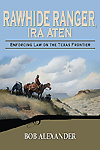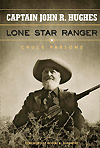
 Captain John R. Hughes: Lone Star Ranger, by Chuck Parsons, University of North Texas Press, Denton, 2011, $29.95
Captain John R. Hughes: Lone Star Ranger, by Chuck Parsons, University of North Texas Press, Denton, 2011, $29.95
Rawhide Ranger, Ira Aten: Enforcing Law on the Texas Frontier, by Bob Alexander, University of North Texas Press, Denton, 2011, $32.95
On August 10, 1887, John R. Hughes raised his hand before Williamson County clerk J.W. Hodges and swore to “faithfully and impartially discharge and perform all the duties incumbent upon me as a member of the Frontier Battalion.” Hughes, who had impressed the Texas Rangers by spending 1883–84 tracking down thieves who had stolen his horses and by his subsequent service when deputized by Ranger Sergeant Ira Aten, later said he was “expecting to stay only six to eight months.” Instead, it became his career. In the first 10 years he advanced from private to captain—often by taking on the duties of a slain superior—and ended up retiring only when compelled to, in 1915.
Although Hughes is not among the most famous Wild West lawmen, he was skilled at bringing in mal hombres—killing only when he had to, but certainly having to do his share—and he earned local fame while contributing to the Rangers’ collective renown. Using a wide variety of original sources, “Texan by choice” Chuck Parsons sheds unprecedented light on Hughes’ personal life as well as his many exploits with the legendary Rangers. Just one example of Hughes’ doggedness was his off-and-on search for the bandit who killed fellow Ranger Charles H. Fusselman in April 1890. Eight years later Hughes finally tracked the killer, Geronimo Parra, to the New Mexico penitentiary, where Parra was doing time for other crimes under the alias of José Nuñez. With equal persistence, Hughes got Parra extradited to Texas, conveyed him aboard a train on which friend and colleague Sheriff Pat Garrett happened to be traveling to El Paso, and delivered Parra for trial, conviction and, on January 5, 1900, a suitable suspended sentence.
For anyone curious about the man who first deputized Hughes, well, by curious coincidence he’s got a biography out, too, courtesy of another well-practiced expert in the field. Bob Alexander focuses on Ira Aten, whose career largely ran parallel to that of Hughes as both men strove to enforce justice on the wide-open and often treacherous Texas terrain. Alexander notes that made-up dialogue marred previous accounts of Aten, but that he sticks to documented quotes, such as one from P.C. Baird, deputy sheriff for Mason County (and a former Ranger) in his request to the adjutant general in Austin: “If you could favor me with Ira Aten’s services a short time, I could do the work without any real trouble, as he is not known in this section….I have a hard set to deal with and will very probably be compelled to make a killing, is why I want Aten.”
Aten was a religious, devoted family man, unlike Hughes, who never married, though both were guided by a firmly set moral compass that told them what was right and wrong—just like those stereotypical heroes in old Westerns. Even so, while traveling in his later years, Aten revealed a mind troubled by past violence when he wrote his wife, “Been thinking about badmen and killing all day, and my mind is not fit to go to church.”
Both Hughes’ and Aten’s lives were as long as they were eventful, but Aten was crestfallen when he learned that Hughes, 82, had died on June 3, 1947, with a bullet from a .45-caliber Colt in his head, most likely at his own hand. Aten’s was a considerably quieter passing, on August 6, 1953, a month short of 90.
One has the impression there is room for many more individual Texas Ranger bios in future, and undoubtedly more will come, with or without Bob Alexander’s compulsion to question posterity’s fairness as he compares more modest, hitherto-obscure lawmen to the likes of overhyped Wyatt Earp. Aten and Hughes were two among many Texas Rangers just doing their job, which just so happened to collectively forge a reputation that must still humble anyone who swears in to that organization today.
—Jon Guttman




